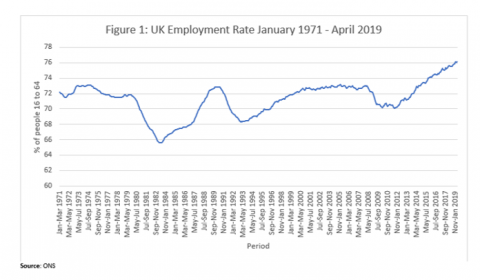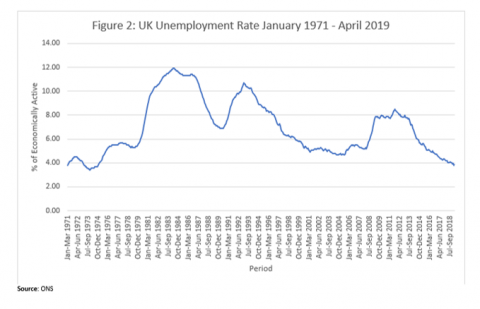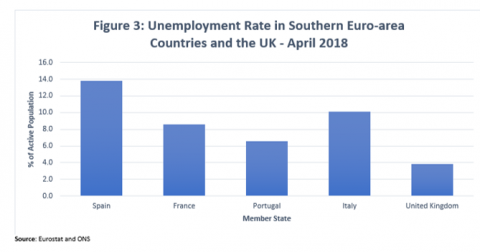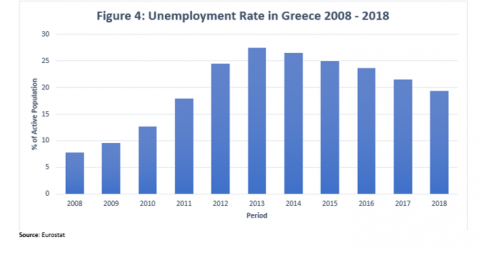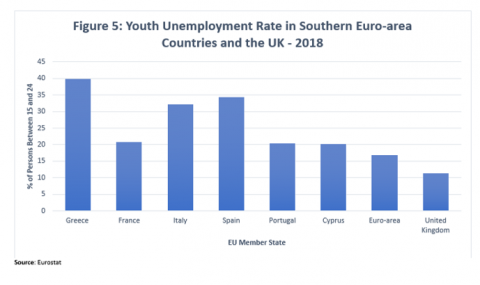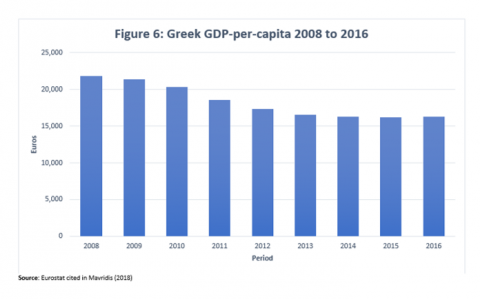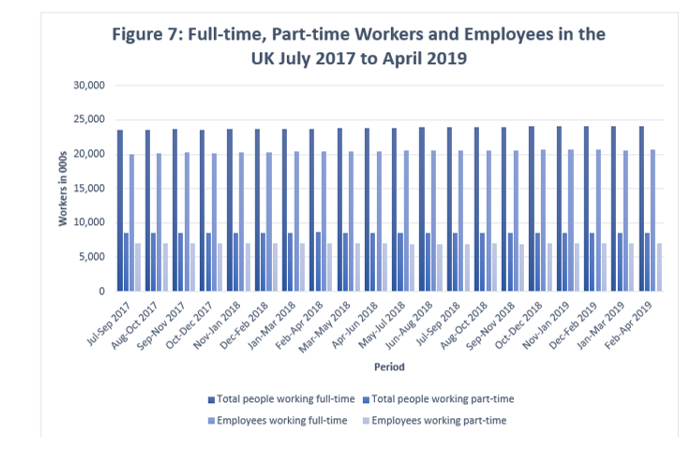Bruges Group Blog
The EU, Brexit and Employment Market
Where Unemployment Really Is
Before the referendum in 2016 we were told by George Osborne and the Treasury, among others, that 820,000 jobs alone would be lost as a consequence of a Leave vote, causing "an immediate economic shock" but here we are over three years later and unemployment is at its lowest for over 40 years. Those figures published by the ONS in June 2019, employment is standing around 76.1pc with unemployment at its record low since 1974 at 3.8pc and the trend looks as if it will only continue to fall. The Treasury team of 2016 have been made to look rather foolish and a bit red faced now as unemployment stood at a whopping 6pc this time three years ago with employment statistics coming in at 74pc which equates to roughly 31.4 million.
Contrastingly, as the UK has a record level of unemployment the same cannot be said for the EU with April's numbers suggest the EU27 have an unemployment average of over 6.5pc with nations such as Italy, Spain and Greece hitting double figures. So, does the EU encourage unemployment in any way? Well the answer to that is essentially yes, certainly in states such as Greece and Italy where Brussels controls their budgets with extremely harsh measures of austerity which has led to far left and far right uprisings in both and of course the Gilet Jaunts in Paris in protest of President Macron and the EU.
In the twenty years of the single market since the Maastricht Treaty, the Eurozone has only grown by half a per cent and growth has consistently been behind other advanced economies and fell significantly behind following the Global Financial Crisis. The IMF predict the gap to further widen between the Eurozone and other nations' real output this is a consequence of over excessive regulation and red tape regarding production.
Back to Britain and we see that even though the demand for labour is obviously increasing due to the falling unemployment figures, we don't see a significant, proportional rise in wage inflation. Before inflation is taken into account, wage inflation was around 1.5pc which isn't really fantastic considering the huge spike in employment. The answer to this is of course the availability of cheap labour, mainly from Eastern Europe with workers often willing to work for minimum wage, sometimes even below, that us Brits tend not to want to do. The true affect of this is that it keeps wages for low skilled jobs at rock bottom and disincentivises investment in new technology, investment in training and other ways of reducing production costs. Not only is it keeping wages low in Britain it means that the country that these people have emigrated from will be lacking their experience in their particular field for example a plumber or electrician as well as doctors etc.; it means that these people are potentially paying taxes in Britain or in another country and not their home country who often need it more to develop better infrastructure and facilities similar to that of Western Europe. Most Eastern countries are former Communist countries so require infrastructure upgrades in several areas and with people pouring out it simply isn't doable to upgrade the, in some cases, desperate systems.
The Future Unemployed
As we've seen recently more and more young people are being employed by British firms with 473,000 more people employed than in 2018 with 90pc of those being positioned in a full time role. Economist James Knightley suggested that the British economy is "in better shape than many had been believing" and the good news doesn't stop there with an estimated 850,000 vacancies mainly in the transport and storage sector. Not only is it times of record high employment, 15.4 million women are now in work which is an all-time record so surely Brexit isn't having a huge dampener on our employment market and economic growth. In addition to this, the Treasury predicted less economic growth than there actually was with figures stating that the economy grew by 4.9pc since June 2016 despite Osborne predicting a slowdown. 179,000 more people were employed in the months following December 2018 with 80pc of that figure being made up by females as well as a significant increase in students being employed on a part-time basis as well as a spike in younger people getting employment.
This isn't the only good news for workers though as reports suggest that employment quality is rising following the leave vote with a record number of temporary roles being made permanent as well as more and more being upgraded from part time to full time jobs. Over 85pc of new jobs created are a full time permanent post and are increasingly being filled by those in the 16-25 age bracket, this may be due to better opportunities for apprenticeships but also in the expanding technology market and the greater need for research and development. Wages massively outstripped prices in the latest quarterly forecast with wage inflation at 3.9pc and real inflation at 1.9pc meaning firms were being forced to pay higher wages due to the expanding labour market. This is the joint highest rate of wage inflation since the Financial Crisis meaning that more people have more money in their pockets to spend, giving them greater amounts of disposable income to spend in the wider economy. According to the ONS, wages have been rising a greater rate than inflation for over a year which is better than what most predicted following the referendum result. And despite all of the chaos that has been whirled up by talk of a so called cliff edge Brexit has left the people saying it all a bit red faced with forecasts predicting even further wage inflation due to the reduction in the labour pool meaning firms will become more competitive for workers.
Stronger real earnings have now surpassed the pre referendum result which will "compensate households' spending in uncertain times" according to KPMG UK's Yael Selfin. Not only that with Boris Johnson's pledge to cut income tax and raise the national insurance allowances, British consumers could well be left with plenty more money in their bank accounts as a result of rising wages and Tory tax cuts from the new PM.
Personally, I think that the sooner we jump from the sinking EU ship the better, youth unemployment in the EU is rising in near enough every country and increasingly intrusive measures from Brussels don't help the cause. In Greece, January's numbers show 39.1pc of those aged 16-25 are unemployed which is on par with nations such as Libya, South Africa and former Yugoslavian and Communist states in Eastern Europe such as Bosnia and Herzegovina and Serbia. In 2017, over half of Spain's 16-25 year old population were marked as unemployed which is truthfully an utter disgrace, of course governments have to take some responsibility, but austerity imposed by Brussels on Spain, Italy and Greece has just worsened an already out of control youth unemployment problem. Meanwhile over in Britain, our youth unemployment is roughly around the 10pc mark and has been consistently for the past few years with slight fluctuations, however as firms seem to demand more labour and apprenticeships on the rise it looks like the only way is down for our youth unemployment. The same cannot be said for the failing Eurozone though, with successive increases in youth unemployment for the past three years and now stands at a lofty 16.7pc in the latest figures published by the EU. The brain drain factor has been seen most prominently in Italy, Greece, Spain and across Eastern Europe with all of the most academic students opting to move to established, fairly stable economies such as the UK, France or Germany. This has a detrimental effect and leaves no incentive for France or Germany to change this, it also leaves those countries that so desperately need talent with very little left.
The True Cost of Immigration on Employment
Immigration from the EU has cost British workers jobs and kept wages low due to willingness to work for cheaper and having less living costs, there's been over a 50pc cumulative increase in immigration to the UK from Eastern Europe, especially Romania and Bulgaria over the past 10 years, a trend that started to rapidly take form following the 2008 banking collapse.
Not only are there expanding economies globally thanks to outsourcing, the EU economy is shrinking in general and that is highlighted by the fact that China, India, Brazil and Russia are all growing at a reasonably fast pace with China growing at 15pc per year in some years towards the beginning of the millennium. The failure of the Euro has also contributed to this by trying to mishmash diverse economies of opposite natures together with a single currency and central bank and this has ultimately led to uncontrollable amounts of debt, the rise of populism and of course massive recessions within the Eurozone area with more and more cuts in every EU budget. According to Mr Clegg in the 2016 referendum, over three million jobs relied on EU trade, especially in the automotive industry yet it's the same Liberal Democrat party which wants to completely ban the production of diesel cars by 2035, costing those very jobs they bang on about. The hypocrisy is unbelievable, a slowdown in the purchase of diesel cars and more endless red tape being erected around the world when it comes to emissions have taken their toll on the British car industry especially JLR which produce cars with larger than average diesel and petrol engines yet the media seem all far too keen to blame good old Brexit for this.
The problem with the doommongerers claiming that over three million jobs will be lost due to the reliance of trade with the EU is the fact that it would mean all trade would grind to a halt with our European neighbours. Well of course that simply isn't true, whilst trade may not be as free with the EU, it certainly won't stop – from both of our perspectives it's in our interests to have a good relationship for German car exports, French wine exports, Italian food exports etc. but also our financial services and insurance that we export to the EU as well as other British manufactured goods. To lose three million plus jobs overnight would be pretty catastrophic and people tend to gloss over the fact that unemployment in the UK is on the down whilst over on the continent and especially the Eurozone, unemployment especially youth unemployment is very much on the rise. Not only that, by leaving the EU it opens up endless possibilities to forge better trade links with the Commonwealth and other trading heavyweights such as America and China. Recently we've seen Dr Liam Fox negotiate trade deals with both Switzerland and South Africa as well as India, as Lady Thatcher said "our future is in Europe but not solely in Europe" and she couldn't have spoken a truer word, we do need good trading links with the EU but it doesn't mean we cannot also have good trading links with our old allies who we perhaps may have neglected over the past 30 years or so.
More Money In Our Pockets?
Former Marks & Spencer's Chairman and CEO Stuart Rose who chaired the remain group 'Britain Stringer in Europe' even admitted that "quite frankly, the price of labour would go up" when discussing the rise in wages of low-skilled workers following the departure from the European Union. Surely this could only be a good thing, workers having more disposable income to spend on them and their families, providing this wage inflation doesn't overtake actual inflation. Most firms who support staying in the EU or who did in 2016, supported remain for one reason of the access to cheap labour from EU nationals rather than paying a possibly higher wage to a homegrown employee.
Not only does this immigration of low skilled workers keep the lowest wages low it contributes to cranking up house prices and rents, with house prices now eight times the annual wage, compared to twice the average annual salary in 2007. Demand for housing of course drives the price up, no matter what the accommodation is, official figures showed that in 2015 636,000 people legally arrived in the UK (not all from the EU) and in that same year it was shown that house prices had risen nationally (excluding London) by 253pc since 1997 and for London that figure was at an astonishing 434pc increase.
As we keep hearing that foodbanks are on the rise, which is never a good thing to any country, especially one as developed as ours; however, we need to ask ourselves why are people using these foodbanks? Either because of low wages and rising living costs and unemployment in low skilled areas, this of course has direct links to immigration, especially low skilled immigrants such as builders and labourers.
In recent surveys and according to The Independent, wage growth is at its fastest pace since the 2008 Financial Crash and most growth in the last calendar year has been among British nationals. The whole scaremongering process of the remain campaign and prominent people's vote protestors doesn't seem to be washing at the moment with real wages and annual average wages rising again in December and is predicted to do so again this year, in contrast to the forecasts set out back in 2016 where unemployment wasn't expected to fall drastically and wage inflation was expected to stagnate more. A reduction in net migration is a contributing factor to that 1.2pc rise in December last year with the pool of cheap labour shrinking, causing firms to offer higher wages to keep their workers or attract new ones.
Brain Drain!
In the field of education, over the past 8 years, the number of university students arriving from Romania has increased by 42pc and 46pc from Italy; this is damaging for both the Romanian and Italian economies as both are in very sorry states following Communism and EU austerity respectively. The chances of these students returning back to their native lands is very unlikely as there is no investment in infrastructure, as previously mentioned, very little opportunities and very few incentives. Therefore, they are likely to get a job abroad in Western Europe where there's plenty of opportunities and will contribute very little, if anything to their home country; all of the best talents in these countries will depart causing a 'brain drain effect' when the best students and highest qualified professionals emigrate to other nations and the EU lets this happen and creates a vicious circle and doesn't allow for improvement of these nations.
Several reports by think tanks such as Migration Watch UK and reports to the House of Lords have consistently suggested that uncontrolled immigration has a severe economic effect on the lowest earners, especially in the market for waiting staff, care work and cleaners. Some low paid workers even seen the effect of deflation in their wages with less hours and less pay, which has a negative multiplier effect and creates more leakages from the circular flow.
A Fairer System of Immigration
This of course doesn't mean immigration cannot be a good thing, after all, Britain has relied on immigration to keep our economy booming. For example, the Windrush generation are vital to Britain and we should never forget that and never forget how important immigrants are to the British economy. However, as Dominic Raab suggested in his leadership campaign that we should introduce a system similar to Australia of a points based immigration scheme. This would give a fair chance to immigrants from all nations, not giving EU citizens priority, it would be based on the demand for that profession or skill rather than the current system of essentially open borders. I think that a points based system like Australia would be the fairest way of immigration to the UK post Brexit with each nationality on the same wavelength and it is profession or skill that determines whether or not that person is needed rather than whether that person is an EU national.
It's not that we need to be anti-immigration and we certainly should not be, but we need to be a little be more cautious on how many people of one profession we let come through our borders or we risk the predicament we have now in especially the construction industry. Often firms will pay EU nationals who come to Britain for work a lower wage as they are more willing to accept it than a British worker, this drives down the price of labour and becomes a significant problem. Brexit isn't about stopping all immigration and shutting our borders it's about being able to choose who we want to come in and at what time, with our destiny in our own hands rather than in some bureaucrats in Brussels.
Global Britain
Personally, I think that our possibilities are endless outside of the EU, we don't need to be part of the European Union the political bloc and rather a member of the European Economic Area which allows the free movement of capital, goods and services as well as the European Free Trade Association. There are amazing chances to forge trade links with developing economies in Asia, Northern Africa, South America and Oceania with a seat on the World Trade Organisation which will allow us to negotiate our own trade deals that suit us rather than the EU's one size fits all trade deal which is generally tailored to Germany and France. Currently, the EU is becoming increasingly anti-business with more red tape which increase business costs and ultimately costs jobs or wage increases due to the increasing cost of keeping up with regulation. Regulation is standard across 28 different economies so therefore makes these regulations vastly inefficient in most countries such as Britain. It's the small businesses that suffer the brunt of the blow of regulation as it's made more difficult to expand the firm and increase it's workforce whilst it is the big firms and conglomerates that benefit from all these rules as it prevents other smaller firms from growing into serious competition. For example, a music license for a year for even a small café would set that small business back £1000 which is in anyone's book a daylight robbery, especially for a small enterprise trying to make it in a competitive market whilst large multinationals can cough up this grand without blinking an eyelid. Additionally, the cost to actually employ someone is on the up with more and more EU legislation being introduced and more procedures put in place, as well as when dismissing a person with good reason they must go through a lengthy process of several warnings and even court proceedings in some cases which costs small firms millions across the UK.
The best thing about leaving the EU has to be the ability and enablement of making our own legislation that protects our firms and encourages competition and incentivises business and enterprise rather than keep laying down the law in the path of firms as an obstruction rather than something that protects them. The ability to forge better trading ties with our old Commonwealth allies is a vital opportunity that cannot be missed and should not be missed, especially when India is one of the fastest growing world economies and of course there's Australia which is also experiencing sweet levels of economic growth. Then of course there's the big two the US and China, now is the time to be getting in America's good books with a British loving President that we haven't really seen since President Reagan in the 1980s who was more than willing to have an extra special relationship with Britain.
Free trade is paramount in our economy and was built on innovation and inventions that have lacked in recent times, the industrial revolution was started here in London, one of the greatest financial capitals of the world is in London and Brexit could be the start of a new global Britain which is even more prosperous than the one we've seen recently. We need to embrace business and encourage people to start up new firms and to innovate in new areas, especially technology this could be the biggest business boom since the privatisation programme in the 1980s.
In summary, when we exit the European Union it will drive up wages but also opportunity for British workers and British students who struggle to get a job following university and end up underemployed. This will happen due to the expanding demand for labour as a result of developments in sectors such as transport, technology and artificial intelligence as well as of course the shrinking pool of cheap labour due to reduced immigration of low skilled workers.
Please share your thoughts on Twitter and Instagram with me @ethan_thoburn
Here is the full report and paper
http://www.brugesgroup.com/images/papers/theeubrexitandtheemploymentmarket.pdf
References:
https://ec.europa.eu/eurostat/statistics-explained/index.php/Unemployment_statistics
https://www.bbc.co.uk/news/uk#-politics-eu-referendum-36355564
https://fullfact.org/economy/how-accurate-have-brexit-forecasts-been-referendum/
https://www.worldatlas.com/articles/the-highest-youth-unemployment-rate-in-the-world.html
https://www.statista.com/statistics/266228/youth-unemployment-rate-in-eu-countries/
Contact us
246 Linen Hall, 162-168 Regent Street
London W1B 5TB
Director : Robert Oulds MA, FRSA
Founder Chairman : Lord Harris of High Cross






